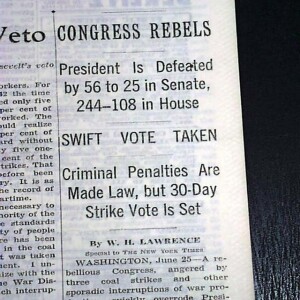Episodes

Sunday Jun 23, 2024
June 25 - Congress Pushes for Wartime Labor Repression
Sunday Jun 23, 2024
Sunday Jun 23, 2024
On this day in labor history, the year was 1943.
That was the day the Smith-Connally War Labor Disputes Act was passed.
In the years before Taft-Hartley, it was considered the foremost slave labor bill.
It gave the president the power to seize and operate war industries confronted with strikes or lockouts interfering with war production.
It also criminalized any future strikes in seized plants with $5000 fines and up to a year in prison.
And it held unions in war-related industries liable for damages incurred if they failed to give 30-day strike notices.
The law was passed just four days after miners struck in protest of a War Labor Board decision that denied all of their contract demands.
Congress overrode President Roosevelt’s veto in passing the Act.
But critics argued that FDR vetoed the bill over parts that did not go far enough to suppress strikes.
President Roosevelt argued for a proposed amendment that would “enable us to induct into military service all persons who engage in strikes, stoppages, or other interruptions of work in plants in possession of the United States.”
The bill effectively criminalized any worker that dared to defy the wartime no strike pledge, even as wages and working conditions quickly deteriorated in the face of massive defense industry profits.
Miners were outraged by threats of conscription and jail time if they dared to strike.
UMW president John L. Lewis refused to comment on the Act.
But other UMW leaders lamented that the bill would hurt AFL and CIO unions.
As far as the UMW was concerned though, the bill “wasn’t worth the paper it was written on.”
The Act expired In June 1947.
It was superseded by the detested Taft-Hartley Act.


No comments yet. Be the first to say something!